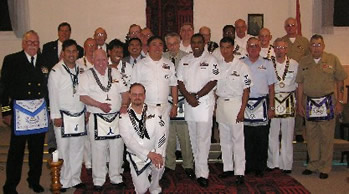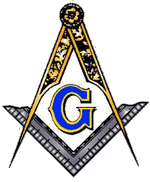My New-Cut Ashlar
by
Brother Rudyard Kipling
Click Here
My Mother Lodge
Click here
Don't Apologize
Click here
Welcome To Our Humble Lodge!

View Photos of Our Salmon BBQ!
Click and enjoy the slide show.
Last Words of the Builder King
‘Twas. In the years of long ago
The mighty task was done,
The waiting Craft in silence bow
And list to Solomon:
“Oh bind the tie, Freemasons dear,
Where’er you feet may rove,
With gifts the empty hand to cheer,
The wounded heart with love!
“Whatever lands your skill reward
With Level, Plumb and Square,
Oh teach the Golden Rule of God,
And be Freemasons there.
The bread, the wine of quick relief
Have ready to your hand;
For tear and sigh of brother-grief
Fulfill my last command.
And though from Sion you depart,
Still do your Master’s will,
That you may build, with hand and heart,
Upon the heavenly hill!”
Robert Morris, L.L.D.
Masonic Poet Laureate
1896
On Oaths and Honor
by
Steve Osborn
WHEN Keith Ellison, a Muslim, announced that he intended
to take his oath of office on the copy of the Holy Qur’an
once owned by Thomas Jefferson, it generated quite a hue
and cry. Jefferson would have been astounded by the reaction as he
was the author of the Statute of Virginia for Religious Freedom,
which recognized the right of all men to worship in the manner they
choose, free of let or hindrance. WB Carl Claudy wrote a chapter on
the subject in his book Old Tiler Talks, which I include below.
Book on the Altar
“I heard the most curious tale,” began the New Brother seating
himself beside the Old Tiler during refreshment.
“Shoot!” Commanded the Old Tiler.
“Friend of mine belongs to the Midwest Lodge. Seems they
elected a chap to become a member but when he took the degree he
stopped the work to ask for the Koran in place of the Bible on the
altar. Said he wanted the holy book of his faith, and the Bible wasn’t
it!”
“Yes, go on,” prompted the Old Tiler. “What do they do?”
“The officers held a pow-wow and the Master finally decided that
as the ritual demanded the ‘Holy Bible, Square and Compasses’ as
furniture for the Lodge, the applicant was wrong and that he’d have
to use the Bible or not take his degree. And the funny part was that
the initiate was satisfied and took his degree with the Bible on the
altar. I’m glad they have him and not this Lodge.”
“Why?”
“Why, a chap who backs down that way can’t have very much
courage; I’d have had more respect for him if he’d insisted and if he
couldn’t have his way, refused to go on with the degree.”
“All wrong, brother, all wrong!” Commented the Old Tyler.
“The Mohammedan initiate wasn’t concerned about himself but about
the Lodge. He showed a high degree of Masonic principle in asking
for his own holy book, and a great consideration for the Lodge. This
man isn’t a Christian. He doesn’t believe in Christ. He believes in
Allah, and Mohammed is his prophet. The Bible, to you a holy book,
is to him no more than the Koran is to you. You wouldn’t regard an
obligation taken on a dictionary or a cookbook or the Koran as
binding, in the same degree that you would one taken on the Bible.
“That’s the way this chap felt. He wanted to take his obligation
so that would bind his conscience. The master would not let him,
because he slavishly followed the words of the ritual instead of the
spirit of Masonry.
“Masonry does not limit an applicant to his choice of a name for
a supreme being. I can believe in Allah, or Buddha, or Confucius, or
Mithra, or Christ, or Shiva, or Brahma, or Jehovah, and be a good
Mason. If I believe in a Great Architect that is all Masonry demands;
my brethren do not care what I name Him.”
“Then think you this chap isn’t really obligated? I must write my
friend and warn him –“
”Softly, softly! Any man with enough reverence for Masonry in
advance of knowledge of it, to want his own holy book on which to
take an obligation would feel himself morally obligated to keep his
word, whether there was his, another’s, or no holy book at all on the
Altar. An oath is not really binding because of the book beneath your
hand. It is the spirit with which you assume an obligation which
makes it binding. The book is but a symbol that you make your
promise in the presence of the God you revere. The cement of brotherly love which we spread is not material – the working tools of the
Master Mason are not used upon stone but upon human hearts. Your
brother did his best to conform to the spirit of our usages in asking for
the book he’d been taught to revere. Failing in that through no fault of
his own, doubtless he took his obligation with a sincere belief in its
sacredness. Legally he would not be considered to commit perjury if he
asked for his own book and was forced use another.”
“What’s the law got to do with it?”
“Just nothing at all, which is the point I make. In England and
America, Canada and South America, Australia and part of the continent
the Bible is universally used. In Scottish Rite bodies you will find many
holy books; but let me ask you this; when our ancient brethren met on
hills and valleys, long before Christ, did they use the New Testament on
their altars? Of course not; there was none. You can say that they used
the Old Testament and I can say they used a Talmud and someone else
can say they used none at all, and all of us are as right as the other. But
they used a reverence for sacred things.
“If you write your friend you might tell them that the ritual which
permits a man to name his God as he pleases but demands that a book
which reveres one particular God to be used, is faulty. The ritual of
Masonry is faulty; it was made by man. But the spirit of Masonry is
divine; it comes from men’s hearts. If obligation and books and names
of the Deity are matters of the spirit, every condition is satisfied. If I
were Master and an applicant demanded anyone or any six books on
which to lay his hand while he pledged himself to us, I’d get them if
they were to be had, and I’d tell my Lodge what a reverent Masonic
spirit was in the man who asked.”
“Seems to me you believe a lot of funny things; how many gods do
you believe in?”
“There is but one,” was the Old Tiler’s answer, “Call him what you
will. Let me repeat a little bit of verse for you:
‘At the meuzzin’s call for prayer
The kneeling faithful thronged the square;
Amid a monastery’s weeds,
An old Franciscan told his beads,
While on Pushkara’s lofty height
A dark priest chanted Brahma’s might,
While in the synagogue there came
A Jew to praise Jehovah’s Name.
The One Great God looked down and smiled
And counted each His loving child;
For Turk and Brahmin, monk and Jew
Had reached Him through the gods they knew.’
“If we reach Him in Masonry, it makes little difference by what
sacred name we arrive,” finished the Old Tiler reverently.
“You’ve reached me, anyhow,” said the New Brother, shaking
hands as if he meant it.
Old Tiler Talks
Carl H. Claudy
1915, 2 nd ed. 1949
– — —
I think Brother Claudy is right. To carry it a bit further; A man, ego
driven by greed or lust for power could take an oath in a cathedral, at an
Altar stacked with all the Holy books of the world and it would mean no
more to him than swearing on last week’s grocery list if it suited his
purposes to discard it.
The man of honor, however, whether Mason or not, could take an
oath on last week’s grocery list, or on nothing at all, and would consider
himself bound by his word and his sacred honor to live up to his oath,
his given word, wherever and however given.
Garfield Lodge No. 41
F. & A. M. Of Washington
700 NW Crosby Avenue
Oak Harbor,
WA 98277-3863

